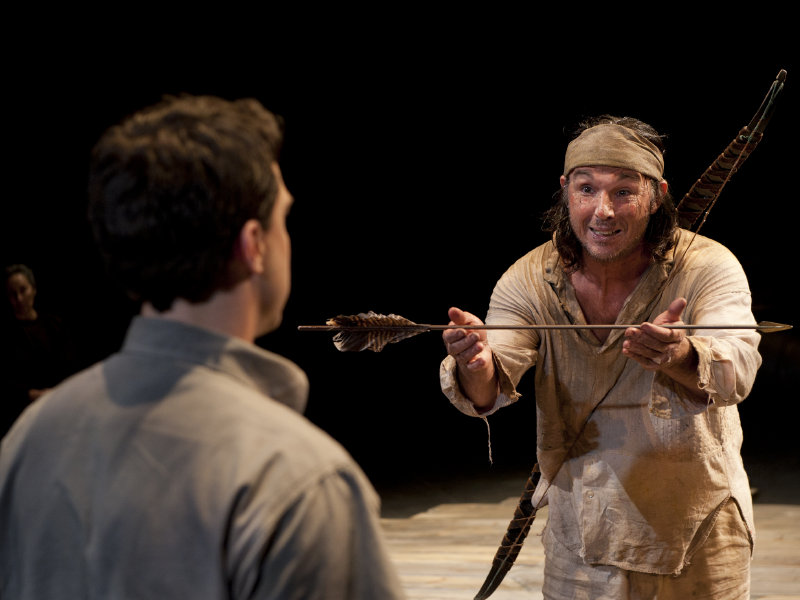SPRING GREEN – For all of its many charms and inducements, the American Players Theatre has spectacularly succeeded at one essential thing. The company, now in its 32nd season, has made Shakespeare clear, compelling and accessible for two generations of theatergoers.
We'll never know how many thousands of people, convinced by boring classroom studies or bad stage productions that they didn't like Shakespeare, discovered here that the Bard actually speaks to them. Superlative speech and voice skills, a comprehensive understanding of the text, and a natural, unaffected acting style make that happen.
It is interesting to note that the same qualities that serve Shakespeare so well are also enhancing our appreciation of two very different 20th century classics here this summer. Noel Coward's comedy of manners, "Blithe Spirit," and Tennessee Williams' unnerving memory play, "The Glass Menagerie," are receiving heightened productions that bring us closer to these works than any other stagings of them I have seen.
Add to that a fascinating interpretation of "The Taming of the Shrew," and we can say that the APT is off to a marvelous start in its 2011 season.
The first 15 minutes of "Blithe Spirit" provide the quintessential APT experience. Two actors sharing the stage with only each other are so in sync, they spin pure gold. Not surprisingly, James DeVita and Colleen Madden are the duo here.
They play a very British upper class married couple awaiting guests they have invited to a seance. Party host Charles Condomine is a writer whose first wife died young. His interest in contacting the dead is purely professional, an attempt to gather authentic details for a book he is writing.
The couple is occasionally joined by an eager but clumsy maid, played with physically comic authenticity by Anne Thompson.
Madden is deliciously brittle, attractive but dangerously sharp edged. Sipping his martini, DeVita is confidently suave. One must think Coward would have loved the way they handle his clever dialogue.
Not only do the two actors possess impeccable timing, they speak with such precise clarity, every nugget of humor and cleverness in the repartee can be caught and enjoyed. I have a new appreciation for Coward's wit.
As the plot unfolds, Charles' first wife is accidentally conjured at the seance, and her spirit moves in with him and the second Mrs. Condomine. The cool Madden and DeVita establish strong contrasts with Deborah Staples' smoothly seductive first wife and Susan Sweeney's wonderfully wacky spiritual medium, Madame Arcati. APT producing artistic director David Frank staged this gem.
AT THE OTHER END of the dramatic spectrum, a richly detailed "The Glass Menagerie" is being mounted in the indoor Touchstone Theatre with vivid emotional results. The show was directed by Aaron Posner, who brilliantly staged his adaptation of "My Name is Asher Lev" at the Milwaukee Rep last fall, and he tilts "Menagerie" slightly away from the realistic presentation it uniformly receives.
In his director's notes, Posner writes that Tennessee Williams was interested in expressionistic production elements when he wrote "Menagerie," but the original Broadway staging ignored that approach and went for straight realism. Nearly all subsequent productions have followed that lead.
Sound and music underscore important moments in the play's dramatic arc. Often the touch is light, but a nasty fight between mother Amanda and son Tom is accompanied by loud aural dissonance.
The conflict between mother and son is played with much more raw emotion than we usually see. That includes moments of genuine tenderness. When Amanda takes off on a memory riff about the day she met their father, Tom and crippled daughter Laura sit like small school children with rapt attention, listening to the tale they have undoubtedly heard before.
Posner leads us through the story with evocative lighting and expansive use of the Touchstone Theatre beyond the edges of the thrust stage. If he wants us to focus on a character's wordless reaction to a situation, he aims a tight light on the figure while darkening the rest of the playing space.
The "Glass Menagerie" actors share with the "Blithe Spirit" cast an exactness of speech and performance that deepens the characters and the play. Susan Shunk's Laura shows a much larger palette of colors and feelings than most.
She smiles, gestures and is genuinely expressive. Greater depth and empathy from the audience results.
Sarah Day gives us a broader and deeper Amanda. Her shrill and hurtful outbursts, projected at her adult children, make us shudder, but we also perceive a desperate mother worried about family economic survival during the Depression.
Darragh Kennan's Tom blends a sad intelligence into the understatement that is the customary approach to the dual role of narrator and brother of Laura. He is as haunted as Laura is haunting.
Marcus Truschinski contributes an affable, easy going energy as the gentleman caller. His explosive timing in dialogue provides effective punctuation to the Wingfields' sorry situation.
THE SHAKESPEAREAN CANON contains some works that are considered his "problem plays." They are simply not as well written as the others.
Cultural changes have caused different problems for two of Shakespeare's frequently produced works – "The Merchant of Venice" and "The Taming of the Shrew." Every time a director begins to stage either, he or she must confront society's increasingly enlightened attitudes about segments of people.
The concept of taming a woman has become repugnant to Western values, and director Tim Ocel has approached "Shrew" with an intriguing and effective idea. Title character Katherine is a tragic figure whose foul moods are rooted in unspoken suffering.
Placed in a gray dress, Tracy Michelle Arnold's Kate appears to be more in mourning than spoiling for a fight. There is no sign of the smoldering peevishness we so often see in the character.
Fear of vulnerability is the likely spark that causes her to go on the warpath. Compassion and tenderness are not foreign to her. Arnold is older than most actresses who play Kate, and she convincingly portrays a heavy-hearted world weariness.
Far from the familiar romp we have come to expect, this "Shrew" is a love story that turns quite sweet at its end. James Ridge's "madcap ruffian" of a Petruchio becomes an engagingly sensitive and attentive husband, and we are left wondering who tamed whom. I wouldn't bet against Kate.
The production features Victorian costumes for everyone but Petruchio and his pals, who are dressed as rustically disheveled Italian military men.
"Blithe Spirit," "The Glass Menagerie" and "The Taming of the Shrew" are currently being performed in rotating repertory with "The Critic" and "Crime and Punishment" on the APT's two stages. "The Tempest," "Of Mice and Men" and "The Cure at Troy" will join the lineup next month.
Damien has been around so long, he was at Summerfest the night George Carlin was arrested for speaking the seven dirty words you can't say on TV. He was also at the Uptown Theatre the night Bruce Springsteen's first Milwaukee concert was interrupted for three hours by a bomb scare. Damien was reviewing the concert for the Milwaukee Journal. He wrote for the Journal and Journal Sentinel for 37 years, the last 29 as theater critic.
During those years, Damien served two terms on the board of the American Theatre Critics Association, a term on the board of the association's foundation, and he studied the Latinization of American culture in a University of Southern California fellowship program. Damien also hosted his own arts radio program, "Milwaukee Presents with Damien Jaques," on WHAD for eight years.
Travel, books and, not surprisingly, theater top the list of Damien's interests. A news junkie, he is particularly plugged into politics and international affairs, but he also closely follows the Brewers, Packers and Marquette baskeball. Damien lives downtown, within easy walking distance of most of the theaters he attends.







